In recent years, green marketing and sustainability issues have been at the forefront of corporate discussions for many brands. Individuals, as well as enterprises, are working together to build conditions for environmental growth and to balance consumption and conservation.
An American technology company, IBM, conducted research. It found that about six in ten consumers surveyed would like to change their shopping habits. In addition, they point to the importance of sustainability. About 70% of them are willing to pay 35% more for eco-branded products.
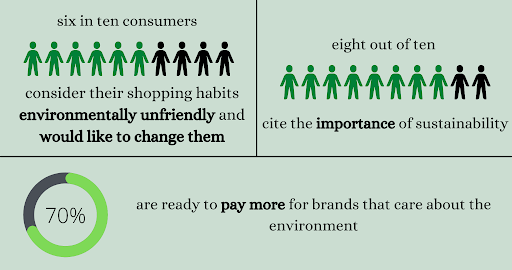
Sustainability is no longer just about caring for the environment. It is already a prerequisite for companies to maintain their place in the competitive market.
This article will concisely define sustainable marketing and analyze several notable eCommerce brands leveraging this strategy. By reading it, you’ll understand that even small businesses can find their niche in the sustainable movement.
What Is Sustainable Marketing?
Sustainable marketing concentrates on producing and selling environmentally friendly products. Plus, it promotes sustainable practices in public relations. Its main goal is to ensure a business provides ecologically safe products and manufacturing processes.
Quite often, sustainable marketing is synonymous with green marketing, but they’re somewhat different. Green marketing strives to meet the needs of buyers interested in preserving and enhancing the ecosystem. So it focuses on developing and selling products with a minimal negative environmental impact.
Sustainable marketing touches on a broader scope. It is based on long-lasting development principles and goes beyond just the environmental context. This type of marketing advocates for integrating renewable production technologies, consumption, as well as humanity’s social and ethical well-being.
Sustainability on the eCommerce Marketing Agenda
Even as a small eCommerce business owner, you can benefit from the sustainable movement. You may start your eco-friendly marketing campaigns with some of the strategies listed below.
-
Going digital
Instead of investing in tons of paper or other resource-intensive mediums, leverage tech-friendly tools like email or social media marketing.
-
Advocating for sustainable working practices
How can you prove your sustainability at work? For example, you can get your own worm farm or launch a reusable dishware program to eliminate the number of wasted boxes.
-
Using Eco-friendly packaging
You can get rid of plastic forever and make cardboard or glass packaging. However, keep in mind that this packaging also consumes resources or ends up in landfills if it cannot be reused.
-
Putting the corresponding price tag
As stated above, customers are willing to pay more for green products. It’s also essential that these goods aren’t tested on animals, and workers’ rights are respected.
Therefore, you need to set a price tag appropriate to the market and explain what is invested in the product’s value. Do you focus on sustainable suppliers or certified manufacturers? Or do you do your best to find local waste recycling plants? The cost of the final product illustrates all these issues.
-
Adhering to your solid sustainable principles
Choose a strategy by which you will conduct eco-friendly marketing campaigns. You can simply say that you care about the planet. But this isn’t enough to be considered a sustainable brand. You can even put your enterprise at risk with greenwashing, that is by imitating your sustainability with no proof of it. Decide on a plan, stick to it, and don’t deceive your customers.
-
Proving your environmental friendliness
As I’ve said, don’t waste your words. You can get various eco-friendly signs of proof and put them on your products, such as the Leaping Bunny or the Nordic Swan ecolabels.
-
Joining environmentally-focused initiatives
Here I mean cooperating with NGOs and donating money or products to charities. These organizations may protect human rights, educate children and women, or protect the environment and ecosystems. Some examples of such initiatives are UNICEF, Children International, Intersectional Environmentalist, and so on.
Four eCommerce Brands That Put Sustainability to Good Use
Let’s divide our examples by the types of products that companies offer and see how they use sustainable marketing strategies as leverage in online retail.
1. Clothing Stores
A luxury fashion house from Germany, Hugo Boss, pays close attention to sustainability issues. They produce entire development programs describing the objectives of their activities in achieving a better future. These include:
a) Ecology
The company aims to reduce CO2 emissions and water use by 40% and energy consumption by 30% by 2025. Also, Hugo Boss is fostering the idea of environmentally friendly stores in all regions.
b) Staff
It strives to provide such working conditions so that everyone can fulfill their potential. The company can grow steadily only when an employee makes the maximum contribution.
c) Company Partners
All partners have to pay employees fairly, respect human rights, and ensure a safe workplace. In addition, all suppliers of finished products must guarantee transparency regarding social, environmental, and economic efficiency factors.
d) Society
The company contributes to activities for children at risk, UNICEF education projects in Africa, and professional development programs for women in Turkey.
e) Products
In the screenshot below, you can see an example of how the company achieves its ecological product goals. For example, Hugo Boss creates garments from organic cotton, hemp, traceable wool, and undyed fabrics. They create innovative and sustainable product solutions from pineapple leaf fibers to plasma processing of wool and virtual 3D prototypes.
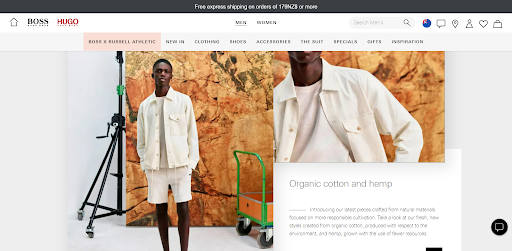
Screenshot taken on the official Hugo Boss website
2. Shoe Brands
The history of the TOMS footwear enterprise began when the founder launched the One for One® strategy in 2006. According to this model, the company sent one pair of shoes to a child in need for every pair of shoes that was bought. From the start of this strategy, it brought over 100 million pairs of shoes gifted.
The company also keeps up with the principles of sustainable production from recycled and biodegradable plant-based materials. It intends to reduce waste and energy use and create a better tomorrow.
TOMS doesn’t turn away from social issues as well by developing its philanthropy model. The firm partners with non-profit organizations and supports various local initiatives and projects to ensure social justice and respect for human rights. They promote their values on the Instagram account, like in the screenshot below.
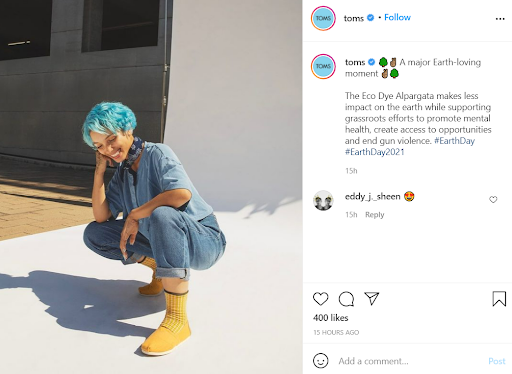
3. Skincare Sellers
In 2008, Indie Lee faced a rare brain tumor. Doctors believed it could have formed due to the environment and the cosmetics the woman was using. This moment became a turning point in the life of Indie Lee. She set out to educate others about healthy and conscious choices and created her own skincare label, Indie Lee, with no prior experience.
Experts craft products from natural ingredients, respecting both consumers and the environment. Indie Lee has a Leaping Bunny certificate and is 100% cruelty-free.
As for training, the company publishes its Indie’s Journal on the site. The information has different categories and comprises various topics. For example, there are interviews with experts, podcasts, tutorials, and the blog of the brand’s creator.
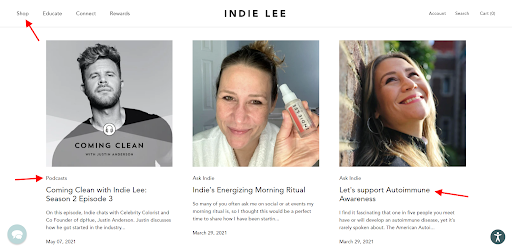
4. Jewelry Brands
Aurate is a brand selling hand-made jewelry using 100% recycled gold. However, it’s not all that is included in their sustainable development agenda:
- The company makes sure that their diamonds and gemstones, as well as working conditions, meet strict standards.
- Aurate promotes respectful relationships with indigenous peoples.
- It supports philanthropic initiatives.
- The brand partners with manufacturers who share their values.
- Aurate also assists and empowers children in need across the United States. They cooperate with Mastery Charter, providing a book in your honor for every piece of gold you purchase.
As the goods are created in New York, the final price doesn’t have any import taxes added. To learn more about the idea standing behind the brand, you can go to the Aurate Instagram account. Then you will find the “Our Story” tab in the saved stories. The firm also uses email marketing to talk about its sustainable products and values.
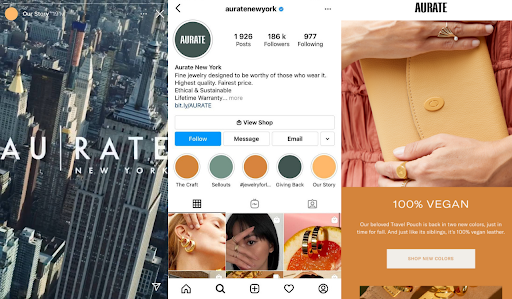
Final Thoughts
eCommerce stores try to build stronger relationships with their clients. If a company doesn’t respect values and social causes, consumers are unlikely to choose it. Therefore, brands should make clients’ voices heard and their needs met.
For example, they should know how to reach their audience via various platforms and understand the headless eCommerce definition or provide an impeccable shopping experience.
As for sustainability, small companies can provide consumers with Eco-friendly packaging such as boxes made from recycled materials. Or they can emphasize that their production requires less energy or waste. The environment always demands the attention of every member of society. Thus, companies will continue to increasingly implement sustainable marketing strategies.


